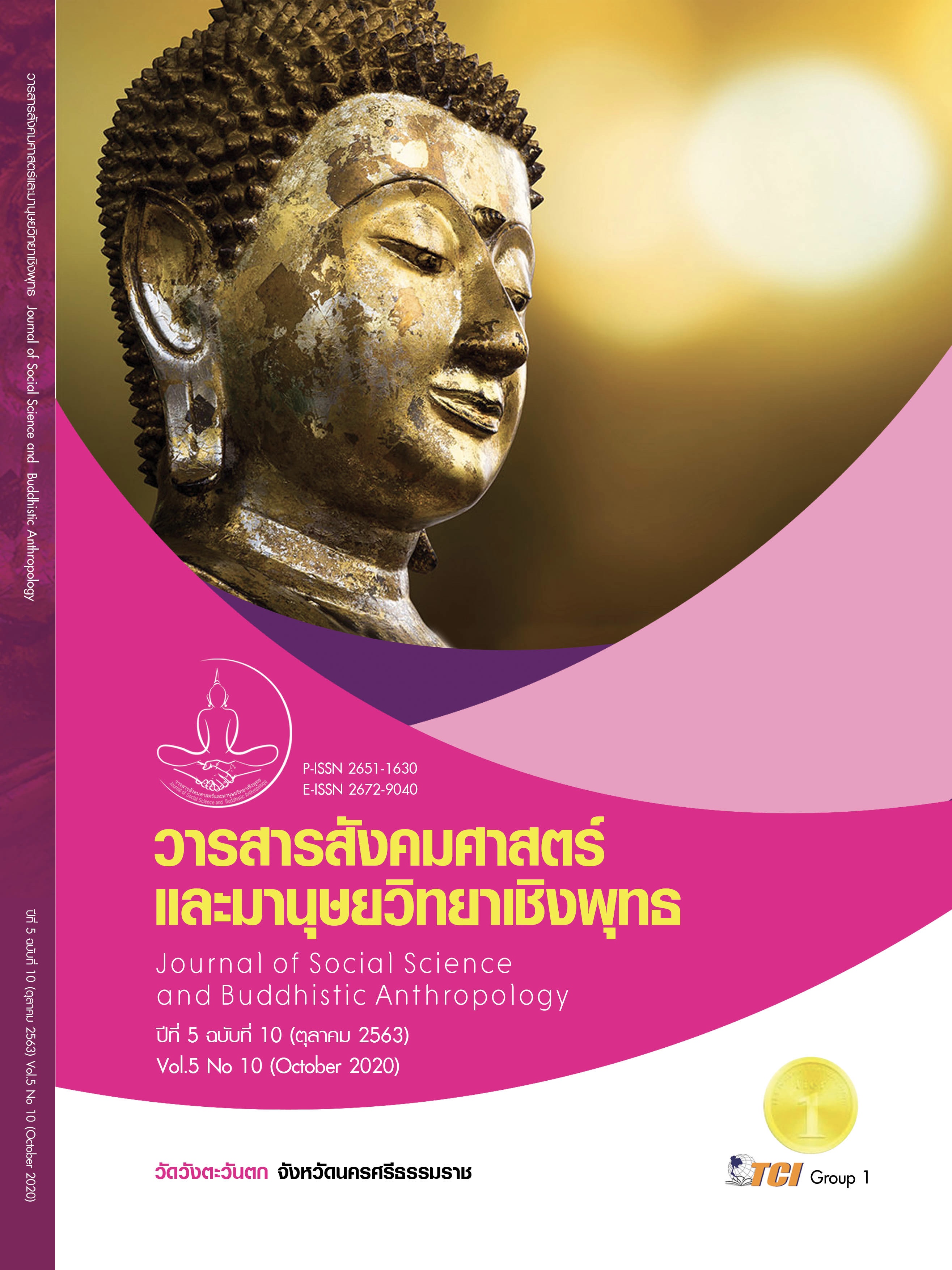TESTING THE VARIABILITY OF THE CAUSAL FACTOR MODEL THATAFFECTS THE QUALITY OF ACCOUNTING DATA AND FINANCIAL SUCCESS OF SMALL AND MEDIUM-SIZED HOTELS IN THAILAND
Keywords:
Invariance, Accounting Data Quality, Financial SuccessAbstract
The objectives of this research article were to test empirical data on the variability of the causal factor models on the quality of accounting information and the financial success of small and medium-sized hotel businesses in Thailand. By reviewing relevant research textbooks and collecting data from small and medium hotel businesses in Thailand registered with the Tourism Authority of Thailand, this research was a quantitative research using questionnaires from a specific sample of 322 people. The statistics used for data analysis were percentage and statistics used to test hypothesis, model, structural equation, researcher using LISREL 9.30 program. The results revealed that the causal relationship model of accounting data quality and financial success of small and medium-sized hotel businesses. Most of the respondents were female 76.7 percent, with a bachelor's degree 63.04 percent, more than 16 years of work experience 39.44 percent, of which 89 business owners or 27.64 percent. Business model is a limited company 55.28 percent, less than 30 employee’s 70.19 percent, the number of rooms from 30-100 rooms 55.90 percent, monthly income more than 90,001-baht 31.99 percent, monthly expenses less than 20,000-baht 36.34 percent. The same structure model has no differences. There is a variation of the model, but the parameters with in the model are different, or there is a partial variation between the Professional Accounting Skills influence (PAS), Professional Ethics in Accounting (PEA) and Management Accounting (MA), for Financial Success data (FS), Professional Skills Accounting (PSA), Management Accounting (MA) based on the model consistency index. Chi-Square = 668.95, df = 208, /df = 5.82, SRMR = 0.10, RMSEA = 0.12, NFI = 0.87, NNFI = 0.86, CFI = 0.89.
References
กรมการท่องเที่ยว. (2558). สถิตินักผู้ประกอบการ. เรียกใช้เมื่อ 10 มกราคม 2562 จาก http://www.tourism.go.th.
กรมพัฒนาธุรกิจการค้า. (2562). บทวิเคราะห์ธุรกิจโรงแรม. เรียกใช้เมื่อ 12 กุมภาพันธ์ 2562 จาก https://www.dbd.go.th/more_news.php?cid=1622
กระทรวงการท่องเที่ยวและกีฬา. (2561). บทวิเคราะห์ธุรกิจโรงแรมรีสอร์ทและห้องชุด. เรียกใช้เมื่อ 15 มกราคม 2561 จาก http://www.efe.or.th/project.php
การท่องเที่ยวแห่งประเทศไทย. (2558). รายงานสถานการณ์การท่องเที่ยว. เรียกใช้เมื่อ 15 มกราคม 2561 จาก https://secretary.mots.go.th/ewtadmin/ewt/policy/download/article/article_20170509152835.pdf
การท่องเที่ยวแห่งประเทศไทย. (2561). รายชื่อธุรกิจโรงแรม. เรียกใช้เมื่อ 10 มกราคม 2562 จาก http://econtent.tat.or.th/ReportWeb/views/g08/hotel-list-table. xhtml;jsessionid=0ejaNKEv8+XEeAqzDEPcTPB.undefined
กุสุมา ดำพิทักษ์ และคณะ. (2556). นักบัญชีที่องค์การธุรกิจต้องการ “เก่ง + ดี”. เรียกใช้เมื่อ 12 กรกฎาคม 2561 จาก http://www.repository.rmutt.ac.th/handle/123456789/190.
จิรัฐ ชวนชม และนงลักษณ์ โพธิ์ไพจิตร. (2556). ปัจจัยสู่ความสำเร็จในการบริหารธุรกิจการท่องเที่ยวของธุรกิจนำเที่ยว ในเขตกรุงเทพมหานคร. Journal of Multidisciplinary in Social Sciences, 10(3), 1 - 16.
นงลักษณ์ วิรัชชัย. (2554). การทดสอบความไม่แปรเปลี่ยนของการวัดระหว่างกลุ่มผู้ถูกวัดด้วยการวิเคราะห์โมเดลสมการโครงสร้าง. วารสารวิจัยและพัฒนาหลักสูตร, 1(1), 69 - 80.
นภดล ร่มโพธิ์. (2553). การศึกษาความสัมพันธ์ระหว่างความสำเร็จของระบบการวัดผลการปฏิบัติงานองค์กรกับความสำเร็จทางการเงินขององค์กร. วารสารวิชาชีพบัญชี, 6(16), 43 - 50.
นภดล ร่มโพธิ์ และมนวิกาผดุงสิทธิ์. (2557). เครื่องมือการสร้างมูลค่าเพิ่มให้กับองค์กร. กรุงเทพมหานคร: บริษัท ซีเอ็ดยูเคชั่น. กรุ๊ป จำกัด.
พุทธชาด ลุนคำ. (2562). แนวโน้มธุรกิจโรงแรม. เรียกใช้เมื่อ 24 มิถุนายน 2562 จาก https://www.krungsri.com/bank/getmedia/f24bbbf8-fa88-40cb-a408-f43900993cd7/THQIR_TOUR_4Q17_TH.aspx
สภาวิชาชีพบัญชีในพระบรมราชูปถัมภ์. (2558). มาตรฐานการศึกษาระหว่างประเทศสำหรับผู้ประกอบการวิชาชีพบัญชี. เรียกใช้เมื่อ 20 กันยายน 2561 จาก http://www.fap.or.th/files/st_eduit/3pdf.
สภาวิชาชีพบัญชีในพระบรมราชูปถัมภ์. (2561). มาตรฐานการศึกษาระหว่างประเทศสำหรับผู้ประกอบวิชาชีพบัญชีฉบับที่ 3 เรื่องทักษะทางวิชาชีพ. เรียกใช้เมื่อ 20 มีนาคม 2562 จาก http://www.fap.or.th/files/st_eduit/3.pdf.
Cronbach, L. J. (1951). Coefficient alpha and the internal structure of tests. Psychometrical, 16(3), 297 - 334.
Everaert, P. et al. (2010). Using transaction cost economics to explain outsourcing of accounting. Small Business Economics, 35(1), 93 - 112.
Hair, J. F. et al. (2010). Multivariate Data Analysis. USA: Hall International.
Ismail, K. & Isa, C. (2011). The Role of Management Accounting System In Advanced Manufacturing Environment. Australian Journal of Basic and Applied Sciences, 5(9), 2196 - 2209.
Jöreskog, K. G. & Sörbom, D. (2012). LISREL 9.1: LISREL syntax guide. Chicago: Scientific Software International, Inc,.
Kelloway, E. K. (2015). Using Mplus for Structural Equation Modeling; A Researcher’s Guide. CA: Sage Publications.
Melia, D. (2010). Towards Performance Measurement in Hotels:an Incremental Approach. Retrieved March 19, 2019, from https://citeseerx.ist.psu.edu/ viewdoc/download?doi=10.1.1.1018.7569&rep=rep1&type=pdf
Schumacker, R. E. & Lomax, R. G. (2010). A beginner’s guide to structural equation modeling. (3rd ed.). New Jersey: Lawrence Erlbaum Associates.









